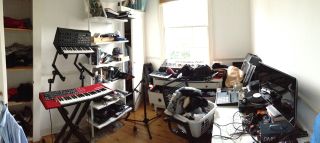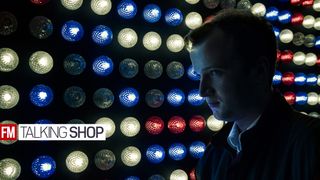London-based American Chris Baio is probably best known for the lithe, post-punk-informed bass guitar lines he contributes to New York-based indie band Vampire Weekend. Yet recent years have seen him branch out and create his own electronic solo productions under the name Baio.
His solo releases, which kicked off with 2012's Sunburn EP, see Baio continuing to play with the world rhythms and funk influences that pepper Vampire Weekend's work, but in a context more akin to Disco and Balearic House. With his latest EP, On&On&On&On, released at the end of last month, FM caught up with the musician to chat about his studio and his approach to production.
When did you start making music, and how did you first get started?
"My original background was in songwriting and playing in bands. I wrote my first song when I was fourteen, it was a funk song called Fatboy Craving. It was maybe Eric Clapton-inspired and it was certainly not good.
"Later on, I'd play in bands where we'd go into a $30 an hour studio to cut as many songs as quickly as possible. The first album I made, which was an alternative/pop-punk band when I was sixteen, we recorded about 18 songs in a day and a half.
"In terms of really getting into production and electronic music, the first piece of gear I would have purchased was an SP-303 around 2007, shortly followed by Ableton."
Tell us about your studio
"I moved from New York to London last summer, and my set up is basically the same - one room at my place. I should also preface things by saying that I'm a raging slob, and that the room is also where I keep all my clothes, so please keep that in mind when looking at the picture! Also, I've recently been working out of a studio in west London and some of my gear is still over there.
"I'm lucky enough to have always used an outside mixer for my solo tracks so I work with a very simple setup - an Apogee Duet is my main interface plugged into a Mac Mini I bought in early 2012. Sometimes I use a BAE 1073 DMP as a pre-amp. The synths I use are mostly a Nord Lead 4, Korg MS-20 Mini, Novation Bass Station II and a Moog Taurus. I bought a Juno used a few years back and it was pretty prominent on my first EP - I should break that guy out again soon!
"I splurged on a CS-50 last year but it's been misbehaving since I moved to the UK. My go-to soft synths are Omnisphere and Gforce Oddity. I also have a lot of love for the Logic synths! I tend to program beats either by cutting things up in Logic or tapping out rhythms with Maschine."

What DAW (or DAWs) do you use, and why did you choose it?
"I use Logic for about 95% of my work - the other 5 is sound design stuff I do in Ableton. I really love both programs but something about Logic ultimately stuck with me. I've been thinking more and more about doing live electronic music so I imagine I'll be spending quite a bit more time with Ableton in the coming months.
"I've been working in Logic 9 since 2010, once I finish a bunch of tracks I've been working on I'm looking to upgrade to Logic X - I feel like I'm ready to start learning new shit!"
What one piece of gear in your studio could you not do without, and why?
"My favorite pieces of gear over the years are my turntable and EXS24 in Logic. The turntable I use to sample is an old Denon my sister got as a Christmas present in the mid-'90s that I eventually inherited. I love pulling sounds off records and then building synths out of those sounds in EXS24. Looking back on my tracks, most of my favorite sounds and textures originate from those two pieces of 'gear.'"
What's the latest addition to your studio?
"I bought Soundtoys Decapitator a few months ago and really love it. It's obviously awesome for drum processing but it works well on samples and vocals as well. I can't recommend it highly enough."
What dream bit of gear would you love to have in you studio?
"Some baller vintage synths would be fun to have but I don't think I'm a responsible enough adult to own any of those yet - when I hit my mid-'30s maybe I'll be a dad with CS-80!"
When approaching a new track or project, where do you start?
"Almost all my electronic tracks start with a sample that I use as the main hook or melody of that track. I've found that it's a lot easier to build a track around a cool sample than to find a cool sample that will work with an already-in-progress track. Taking an old sample and throwing it in Melodyne can yield some pretty dope results - the main hook on my new track Missive was made that way.
"The one exception to this method would be my track Mira, where I found a chord progression I liked and started laying down synths and then finally for the main hook I sang into a mic and chopped it up. Like anything with making music, there aren't strict rules; whatever works for you works."
What are you currently working on?
"I'm turning 30 this year and I'm psyched to say that in the eight months or so I'll be releasing the most music I've ever released in my life. In terms of stuff I can tell you about, obviously first up is my new EP On&on&on&on / Missive, coming out September 29 on Club Mod. I also recently scored a film that should be coming out next year directed by Bob Byington and starring Jason Schwartzman. For that project I was lucky enough to work out of a studio in Austin and got to have some of the incredible Tosca String Quartet play pieces I wrote. It's pretty cool to have something you wrote in midi come alive with real players! There's more stuff beyond those two projects, with time they'll come to light..."
Baio's essential music making tips...
Don't get bogged down in the small stuff/know when a turd is a turd
"In 2011 I tried to mix my first ever track myself. I spent two months working on the mix, trying to balance everything, make the synths and samples sound good, and the drums hit hard. What I was really doing, however, was overcompensating for a track that wasn't good. You can spend forever mixing a turd, but no matter what, a turd will be a turd. Don't be afraid of abandoning something if it doesn't feel right, it's important to continue moving forward when working on music."
There's magic in mistakes
"I like having a lot of quantized things in my tracks, but sometimes it can be nice in electronic music to have little fuck-ups and slip-ups. Some melodies I'll program but other ones I'll play. If you play a melody eight times, it's highly likely that you'll end up with eight variations of that same melody. Try and preserve little screw-ups, they can give a track more character."
Parallel processing is your friend
"I recently got obsessed with the warped reverbs in Logic's Space Designer. What I've been doing a lot is writing a melody, then sending that melody to another channel where the track is sent to a warped reverb and then sidechained hard.
"Using parallel processing in this way has made a lot of boring/stock synth sounds sound way more ethereal - the percussive melody and reverb at the beginning of my new track On&On&On&On is an example of this effect. Parallel processing, which at one point I may have been intimidated by, is a great way to make a track sound richer/fuller/doper. Don't be scared of it!"


